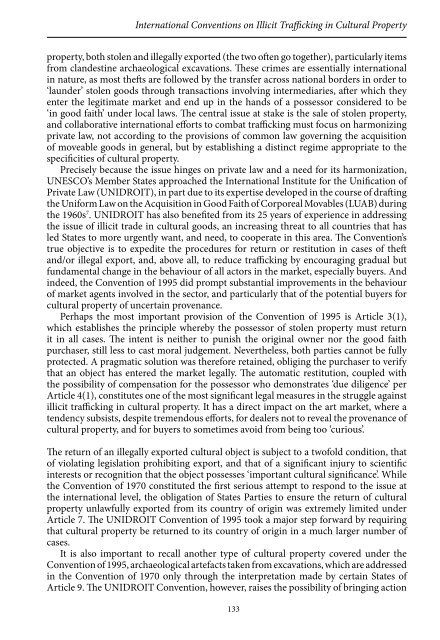Countering
Book_observatory_illicit_traffic_version%20issuu
Book_observatory_illicit_traffic_version%20issuu
Create successful ePaper yourself
Turn your PDF publications into a flip-book with our unique Google optimized e-Paper software.
Sophie Delepierre and Marina Schneider<br />
based on provisions relating either to theft, or to illegal export: per Article 3(2), objects<br />
are considered stolen ‘where consistent with the law of the State where the excavation<br />
took place.’ Article 3(2) as well as Articles 5(3)(a), (b) and (c) also apply to objects<br />
from archaeological excavations. The choice of procedure is largely determined by how<br />
difficult it is to meet the burden of proof in a particular case.<br />
The UNIDROIT Convention represents a compromise reached by addressing the<br />
various legitimate concerns involved. On the one hand, lies the importance of legal<br />
safeguards for market actors as well as for public and private collections, which is taken<br />
into account through the requirement of due compensation when due, and by the clearly<br />
set out non-retroactivity clause (Article 10). The need for legal safeguards is also satisfied<br />
by the relatively short statute of limitations on bringing an action to demand restitution.<br />
On the other hand, by designating a subset of cultural property to which applies a much<br />
longer statute of limitations (75 years), and in some cases, no limitations at all, the text<br />
takes into account the material and moral interests of the ‘exporter’ States and, more<br />
broadly, those of public collections, religious or cultural institutions, and the protection<br />
of archaeological and architectural heritage. The same exception to the statute of<br />
limitations is extended to sacred objects and communally important cultural objects of<br />
tribal or indigenous communities, bearing witness to a more inclusive dialogue among<br />
all cultures. The interests of exporter States are also taken into account in Article 4(2)<br />
providing for ‘all reasonable efforts’ to be made to ensure that compensation be paid by<br />
those responsible for illicit trafficking, rather than legitimate title holders or requesting<br />
States.<br />
A clear influence<br />
Beyond the mandatory implementation of States Parties to the Convention of 1995, the<br />
principles expressed by the Convention, especially the notion of due diligence, have been<br />
adopted or recognized by the jurisprudence and incorporated into national legislation<br />
of States that are not Parties to the Convention, as is the case in Switzerland (Articles<br />
16 and 24 of the Federal Act on the International Transfer of Cultural Property of 2003,<br />
or CPTA) and the Netherlands (new Article 3(87) of the Dutch Civil Code). These two<br />
States signed the Convention but did not subsequently ratify it mainly due to resistance<br />
from the art market. This has been called ‘the Convention of 1970 plus option’.<br />
At the European Union level, the revisions the Directive 2014/60/EU of the European<br />
Parliament and of the Council of 15 May 2014 relating to the return of cultural objects<br />
unlawfully removed from the territory of a Member State and amending Regulation (UE)<br />
No. 1024/2012, incorporate, twenty years later, several features from the UNIDROIT<br />
Convention. Among the most significant features, the burden of proof regarding the<br />
exercise of due diligence to the possessor, as well as the criteria for due diligence, are<br />
taken, almost word for word, from Article 10 of the UNIDROIT Convention. The 28<br />
Member States of the European Union have until the end of 2015 to enact domestic<br />
legislation in compliance with the Directive. This should remove one of the principal<br />
arguments raised by critics of the UNIDROIT Convention.<br />
Universality of the international conventions: increasing the number of ratifications<br />
The international conventions are conceived with universal application in mind, and thus<br />
the Secretariats of international organizations are called upon to develop communication<br />
tools that encourage States to ratify these international instruments. Although the<br />
134


